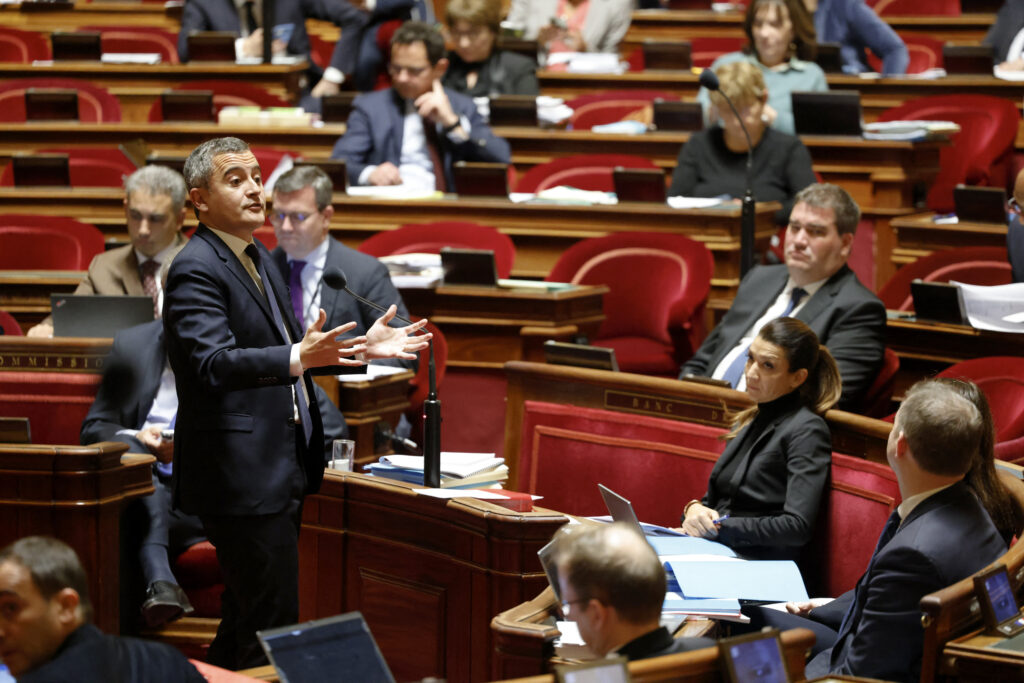
Photo by Ludovic MARIN / AFP
The long-awaited bill to reform France’s immigration policy arrived on Monday, November 6th for consideration by the Senate. Lacking a majority in the National Assembly and in a minority in the Senate, Emmanuel Macron’s party has its work cut out to gain support for this reform and is seeking backing from the centre-right Les Républicains party.
The bill has been postponed several times and is widely expected by the public, most of whom are in favour of a tougher stance. The stakes are high for the government, at a time when a multitude of tragedies and crimes that have shocked the French in recent months have highlighted the clear responsibility of immigration for the increase in insecurity in France.
There is widespread scepticism among French politicians on both the Left and the Right, making it difficult to pass the law, which will not be possible with the votes of the government party, Renaissance, alone. For several weeks now, Macron’s supporters have therefore been engaged in a wide-ranging campaign to win over a majority of MPs to their cause. Keen to maintain contact with representatives and demonstrate his willingness to engage in dialogue, Emmanuel Macron has announced a new summit with all the representatives of France’s political parties, to be held on November 17th in Seine-Saint-Denis—a highly symbolic location, as it is the French département with the highest proportion of immigrant population. A similar meeting was held in Saint-Denis on 30 August this year, but without any convincing results, according to the participants.
The government is prepared to make a major gesture to the Right—whether the Republicans or the Rassemblement National, which is explicitly calling for this measure—by considering amending the constitution to allow social issues such as the end of life or immigration to be included in the scope of referendums. However, Emmanuel Macron has not committed to actually holding a referendum. What’s more, the constitutional amendment, a lengthy process, would have the effect of further postponing immigration reform for many months, something that the President, who is pleading urgency given the current context, wants to avoid at all costs.
Interior Minister Gérald Darmanin is now making the adoption of this bill a personal matter. Interviewed by the public television channel France 2 on Sunday, November 5th, he explained that he was opposed to its adoption via the use of Article 49.3, which was used at the time of the pension reform in the absence of a parliamentary majority. He said he was convinced that there was a middle way that would enable a consensus to be reached. He is thus sending out more and more signals to the Right, advocating ever firmer action. He explained that he wanted to reform the Aide Médicale d’État (AME, State Medical Aid), considered by the Right to be one of the main “suction pumps” for immigration into France. He would like to transform it into Aide Médicale d’Urgence (AMU, Emergency Medical Aid) and restrict its scope, but Prime Minister Elisabeth Borne is not in favour.
Nothing seems certain at this stage. The Republican camp remains divided on the attitude to adopt. Some are ready to compromise with the government, while others are adamant that they disagree on the issue of regularising the status of undocumented workers in high-demand sectors. The government’s salvation could therefore lie on the Left, since the Socialists have announced that they will refuse to vote for a motion of censure against the government coming from the Right—if the opportunity arises. As a result, the left wing of the Macronist party does not see the use of giving too favourable an ear to the demands of Les Républicains. This configuration could lead, against Gérald Darmanin’s wishes, to the adoption of a law that is ultimately much less rigorous than expected—nothing very surprising from a government whose centrist eternal search for balance is in fact only a disguise for a modernised version of the Left.
